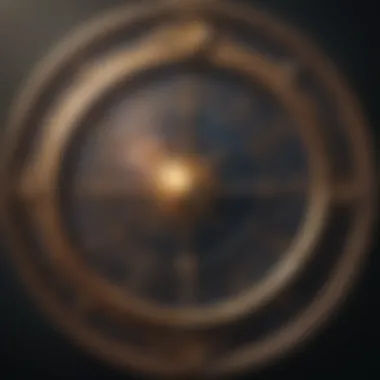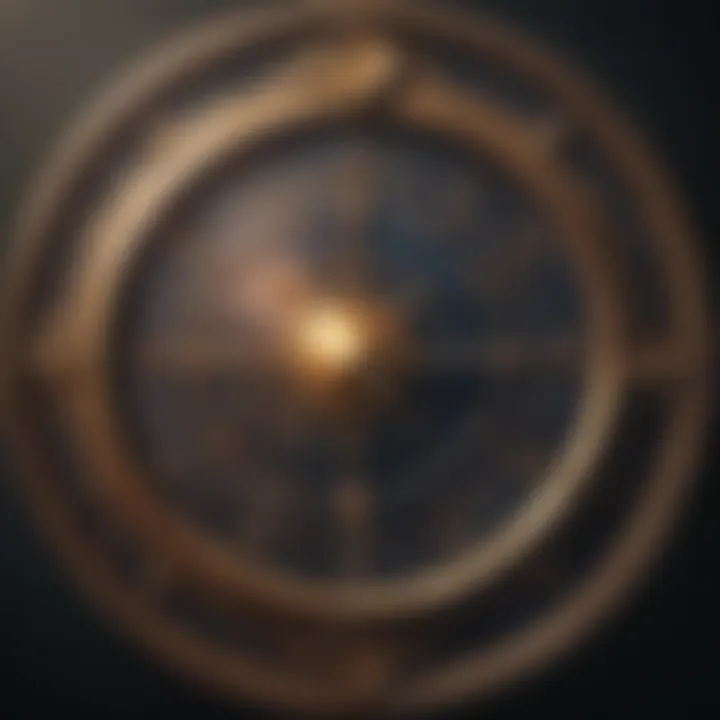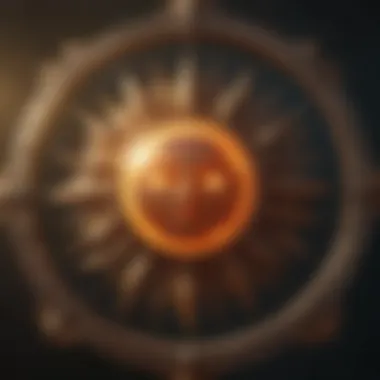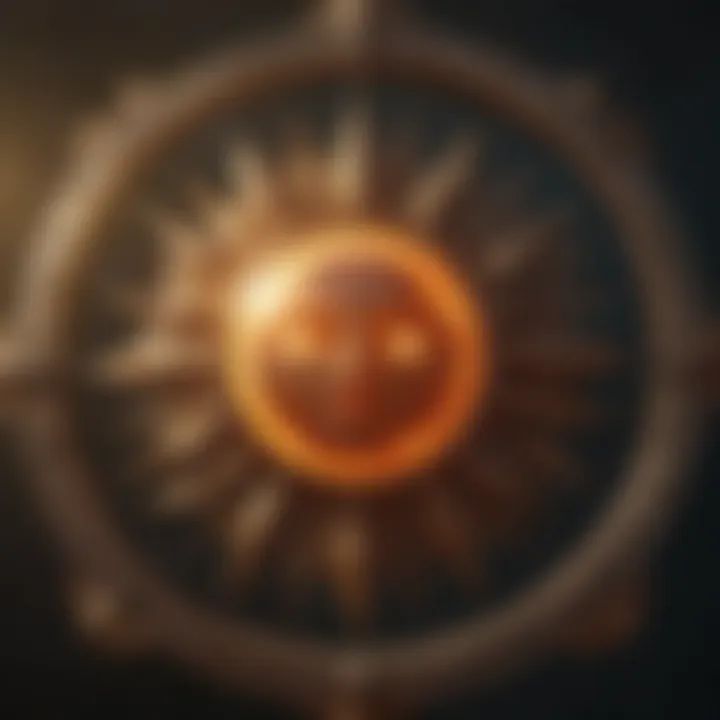Understanding Your Astrological Signs in Depth


Intro
Astrology, often regarded as the mirror of our personalities, offers a profound window into self-discovery. At first glance, one might think it’s a trivial endeavor—reading horoscopes or checking zodiac compatibilities—but there’s more to it than meets the eye. The core of astrology lies in the intricate dance between planets and stars, each playing its own role in shaping who we are. Identifying your astrological signs is not merely about knowing your sun sign; it extends deeper into the realms of the moon and rising signs, creating a complex tapestry of your identity.
Understanding these signs can illuminate facets of behavior, emotional responses, and even decision-making patterns. The exploration of each sign can enhance one's awareness of personal traits and relational dynamics, calling into question the age-old adage, "What’s in a name?" In the case of astrology, it just might be everything.
As we venture into the intricacies of zodiac profiles, we will unpack how the sun, moon, and rising signs influence our lives. We will also touch on compatibility aspects that arise in love, friendship, and even in professional environments. Staying in tune with astrological events can further ground this knowledge, allowing individuals to make more informed choices. This journey promises not only to build self-awareness but also to foster connections with others through mutual understanding and empathy.
Preamble to Astrological Signs
Astrology often gets a bad rap in certain circles, being dismissed as mere superstition without any real basis. However, those who take the time to delve deeper into it often find a wealth of insight waiting beneath the surface. Understanding your astrological signs—particularly your sun, moon, and rising signs—can illuminate many personal truths that are otherwise shrouded in uncertainty. This journey is not just about predictin' the future or figuring out compatibility with your crush. It's about self-discovery and the potential to enhance your personal growth with the wisdom offered by celestial patterns.
Why does it matter? It's simple: By comprehending the elements that define your astrological signs, you gain a sharper comprehension of yourself—your strengths, weaknesses, emotional landscapes, and so forth. Each sign acts as a piece of a larger puzzle, helping to create a fuller picture of your personality and emotional responses. This can guide you in making more informed decisions in various aspects of your life, from relationships to career paths.
Understanding the Basics of Astrology
Astrology isn't just a whimsical activity to flaunt at parties; it's a comprehensive system that maps out human experiences against the backdrop of celestial movements. At its core, astrology posits that the positions of celestial bodies at the time of your birth influence your character and trajectory through life. The sun, moon, and rising signs form the cornerstone of astrological identity. Each serves a distinct purpose: the sun sign reflects your core identity, the moon sign indicates your emotional innards, and the rising sign shapes your outward persona.
For example, if you were born on a sunny day when the sun was blazing in Leo, you'll likely encounter a strong sense of self and creative energy. Meanwhile, if your moon was lounging in sensitive Cancer, you may find yourself feeling deeply and cherishing emotional bonds.
One should not underestimate the significance of these foundations. They are the voices of celestial bodies speaking directly to us, whispering insights that can enrich our understanding of ourselves.
The Role of Celestial Bodies
Celestial bodies aren't just floating rocks in space. They're powerful forces that interact with us, both directly and subtly. The sun, moon, and planets influence our lives and personalities through various cycles and transits. Each body brings its own symbolism and traits, impacting us in unique ways.
- The Sun represents the self, illuminating your core qualities.
- The Moon embodies emotions and instincts, controlling how we react inwardly.
- The Rising Sign, often termed the 'Ascendant,' governs how others perceive you, acting like the mask you wear in social situations.
The fascinating part about astrology is that these bodies continuously interact. For instance, when Venus dances across the sky, it can enhance feelings of love or creativity, while a retrograde Mercury may cause communication hiccups. Understanding these dynamics can not only help in navigating your personal challenges but also in predicting periods of growth or reflection in your life.
"As above, so below" – this ancient adage succinctly encapsulates the essence of astrology. It suggests that the microcosm of human experiences mirrors the macrocosm of the universe, tying us intimately to the heavens above.
In the grand scheme, tapping into the influences of celestial bodies offers not just knowledge, but a compass for life's winding path. When you understand how these cosmic elements play into your existence, you're empowered to steer your ship with greater confidence and grace.
Defining Your Sun Sign
In the realm of astrology, the sun sign often serves as the cornerstone of one's astrological profile. It's the sign that most people are familiar with, frequently referenced in horoscopes and astrological discussions. Defining your sun sign is essential as it offers an illuminating glimpse into your core essence and vital personality traits. Unlike superficial characteristics, the sun sign digs deep into your fundamental nature. Understanding this aspect not only aids in self-awareness but also helps enhance interpersonal relationships and career choices.
Determining Your Sun Sign
To find out your sun sign, the process is quite straightforward. You simply need your date of birth. The sun sign corresponds to the position of the sun during the time you were born, moving through the 12 zodiac signs over the course of a year. The zodiac signs span specific date ranges that define each sign’s period. For example, if you were born between March 21 and April 19, your sun sign is Aries.
If you don't already know your sun sign, a quick online search can yield results promptly. Several astrology websites provide calculators that require basic information. Just give them your birth date, and voila! You have your sun sign. However, sometimes one might find themselves on a cusp, meaning they are born on the boundary between two signs, adding layers of complexity to their astrological profile.
Traits Associated with Each Sign
Each sun sign embodies unique traits that can influence one's character and behavior. Here’s a snapshot of traits linked with various signs:
- Aries: Bold, adventurous, and competitive.
- Taurus: Reliable, patient, and practical.
- Gemini: Curious, adaptable, and communicative.
- Cancer: Nurturing, intuitive, and sensitive.
- Leo: Confident, charismatic, and creative.
- Virgo: Methodical, diligent, and analytical.
- Libra: Diplomatic, charming, and fair-minded.
- Scorpio: Intense, passionate, and mysterious.
- Sagittarius: Optimistic, freedom-loving, and philosophical.
- Capricorn: Ambitious, disciplined, and responsible.
- Aquarius: Innovative, independent, and humanitarian.
- Pisces: Compassionate, artistic, and dreamy.
Understanding these traits is not merely for entertainment; they can offer invaluable insights into personal challenges and strengths. A greater appreciation of one's sun sign allows for movements toward self-development while navigating life’s twists and turns.
"Knowing your sun sign can guide you towards the path of self-discovery and help you recognize patterns in your actions and decisions."
Exploring Your Moon Sign
When delving into the vast realm of astrology, the moon sign often glimmers in the background, but its influence is profound. It's not just a secondary aspect; understanding your moon sign can provide insights that lead to a richer self-awareness and emotional understanding. While the sun sign gives a broad overview of the ego and outward personality, the moon sign dives into the undercurrents of your feelings and instincts. This makes it a critical element for anyone on a path of self-exploration.
The moon governs your inner world—your emotional landscape, intuition, and comfort zones. It plays a crucial role in determining how you respond to challenges and your innate reactions in personal relationships. Therefore, comprehending your moon sign can lead you to a more authentic existence, as it helps in recognizing hidden aspects of your personality that drive your emotional needs.
Furthermore, navigating through the moon sign offers a chance for evolution. By understanding our emotional triggers, we can start to navigate the waters of our responses more skillfully. This can reflect in our relationships as well—understanding the moon sign of loved ones can foster empathy and improve communication, leading to deeper emotional connections.
The Importance of the Moon in Astrology
The moon has held a place of reverence in various cultures, often associated with femininity, intuition, and change. Its role in astrology transcends just being a celestial body orbiting the Earth. The moon affects tides and, by extension, emotions, highlighting the wave-like nature of human feelings.
In astrology, the moon is about reflection — it shines with the light that the sun gives, thus acting almost as a mirror to our inner selves. Knowing its position during your birth can shape your emotional responses and instinctual behavior.
Moreover, the moon also governs family ties, nurturing, and traditions, making it instrumental in shaping your personal history. If you're interested in personal growth, tuning into your moon's influence can provide meaningful insights into your behavioral patterns.
Key Aspects of the Moon's Influence:
- Emotional Responses: The moon greatly affects how you react internally to life's events.
- Intuition: Its position reveals instincts that may not be immediately apparent.
- Nurturing Style: The moon influences your capacity to care for others, impacting family dynamics.
- Subconscious Mind: It influences the deep-seated emotional beliefs we carry through life.
Finding Your Moon Sign
Determining your moon sign requires a bit more than just knowing your birth date. Instead, the process usually takes the date of birth, time of birth, and location into account. Free tools and programs online can help find this information easily. Websites like astrology.com or astro.com provide moon sign calculators based on your birth details.
- Gather Birth Information: You will need your exact birth date, birth time, and place of birth.
- Use a Moon Sign Calculator: Execute your search through online calculators.
- Consult Your Birth Chart: Look for moon placement within your complete astrological chart.
“Understanding your moon sign is like peeling back layers of an onion; each layer revealing deeper emotional truths.”
Once you have your moon sign, you can start to reflect on how its traits manifest in your everyday life. Did you find yourself more introverted in social gatherings? Are you sensitive to criticism? These connections to your moon sign can help you understand why you behave the way you do in various emotional scenarios.
In summary, the moon sign acts like a compass for your emotional voyage. It encourages introspection and helps individuals navigate their personal landscapes with greater ease. As you explore this aspect of astrological identity, you inch closer to the core of who you are.
Understanding Your Rising Sign
In the tapestry of astrology, the rising sign, or ascendant, is a crucial piece. This sign emerges alongside your sun and moon signs to shape how you present yourself to the world. Imagine walking into a room; your rising sign is the persona people notice first. It isn't just surface-level; it often colors first impressions and influences social interactions. This makes grasping your ascendant vital for those delving into self-awareness and understanding others.
One of the significant benefits of knowing your rising sign lies in understanding how you navigate life. This sign also reflects social skills and the way you approach various situations. For example, if your rising sign is Aries, you might come off as bold and straightforward. On the flip side, a Virgo ascendant often showcases a more reserved demeanor, marked by attention to detail. Recognizing these traits equips you with the insight to manage relationships and your responses to situations better, tapping into your inherent strengths.
However, it’s essential to keep some considerations in mind. Your rising sign may not dictate your entire personality. Instead, it weaves into the broader fabric of who you are, interacting with your sun and moon signs to create a unique astrological identity. Therefore, those invested in astrology would do well to factor in how these signs intermingle when interpreting behavior or traits.
"The rising sign is like the first few notes of a song you’ve never heard; it sets the tone for the entire melody ahead."
Defining the Rising Sign


The rising sign refers to the zodiac sign that was on the eastern horizon when you were born. This astrological element is sometimes overshadowed by the sun and moon signs, yet it plays a pivotal role in self-perception and personal expression. When looking at one's astrological chart, the rising sign marks the cusp of the first house, which governs self-image, appearance, and outward behavior.
Each sign has specific characteristics that inform different aspects of an individual’s personality. For example, a Gemini rising tends to be chatty and adaptable, often possessing a quick wit. In contrast, a Capricorn rising may come off as serious and goal-oriented, emphasizing a strong work ethic in their portrayal to the world.
Understanding your rising sign can offer a lens through which you view your interactions. It often provides clues about how you adapt to new environments, approach challenges, and interact with others on a day-to-day basis.
Calculating Your Ascendant
Calculating your ascendant requires a bit more than just knowing your sun sign. The precise time and location of your birth are crucial here. Typically, one would gather the following details:
- Exact birth time: Ideally recorded to the minute.
- Birthplace: City and coordinates can help in accurate calculation.
To find your rising sign, follow these steps:
- Use an astrology calculator: Input your birth details into an online astrology tool, such as those found on websites like AstroSeek or Astro.com.
- Manual calculation: If you prefer a hands-on approach, you can use an ephemeris and a birth chart to pinpoint your ascendant. This requires some understanding of astrological calculations.
- Consultations: If you’re unsure, seeking advice from a professional astrologer might be worthwhile. They can provide not only your rising sign but intricate details about its influence in your chart.
By analyzing your rising sign through these methods, you can gain a clearer perspective on your personal traits and how these may align or clash with your sun and moon signs. This multi-dimensional approach enriches understanding in the journey of self-discovery.
The Relationship Between Your Signs
Understanding the relationship between your sun, moon, and rising signs is a crucial element in the broader exploration of astrology. These three components form the bread and butter of your astrological profile, determining not just your personality traits, but also how you interact with the world. The interplay between these signs serves as a compass that guides your thoughts and actions. Comprehending this relationship can lead to deeper self-awareness and can help navigate personal relationships and life challenges.
Interactions of Sun, Moon, and Rising
The sun sign is often regarded as the core of your identity; it's what you instinctively gravitate towards and how you shine brightly in the world. However, it isn't the whole story. The moon sign delves into your emotional realm, representing your inner self, what you crave emotionally, and the way you respond to your feelings. Then there’s the rising sign, which acts as your social mask or facade—how others perceive you upon first meeting.
So, how do these interact? It's a bit like a dance. Imagine a stage with three performers: your sun sign takes center stage, projecting confidence and charisma. The moon sign, however, lingers backstage, adding depth and vulnerability to the performance. Meanwhile, the rising sign sets the scene, shaping the audience's initial reactions and expectations. The balance and tension between these layers can explain why sometimes you feel conflicted, or why you might see aspects of yourself that others may not immediately understand.
For example, a Leo sun with a Cancer moon and Libra rising may come across as charming and social, yet you might have a softer, emotional side that only close friends see. Your outward persona caters to harmony and beauty, but internally, you crave emotional security—creating a rich tapestry of who you are. This multifaceted nature can lead to the complexity of your relationships, affecting how you relate to others.
"Astrology is a language. If you understand this language, the skies speak to you."
— Dane Rudhyar
Impact on Personal Identity
Your identity is akin to a mosaic, with each piece contributing to a larger picture. The sun sign gives the overall theme, the moon sign adds color and texture, while the rising sign frames it all together. Together, they articulate the nuances of your personality. This intricate interplay can have significant impacts on personal identity.
As you navigate day-to-day living, the signs can influence your choices, your response to stress, and even your aspirations. Knowing these different aspects of yourself can guide you in making better decisions aligned with your true self. For instance, if your sun is in Aries, characterized by boldness and initiative, but your moon is in Pisces, known for sensitivity and intuition, you might find yourself torn between a desire to charge ahead in life and an inclination to retreat into your feelings. Acknowledging these tensions is crucial.
- Allows for deeper self-acceptance. Recognizing these varying influences can lead you to embrace all facets of yourself rather than feeling divided.
- Strengthens relationships. Understanding your own complex nature helps you appreciate others’ differences, leading to healthier emotional interactions.
- Points towards growth opportunities. Being aware of conflicting energies within can provide clear direction for personal growth.
Navigating these relationships among your signs can be an enlightening journey. By observing how they resonate with your life experiences, you can become attuned to the subtler elements at play, enriching your understanding and enhancing your life overall.
Navigating Astrological Charts
Astrological charts, often called natal charts, are vital tools for anyone looking to delve deeper into their celestial makeup. They provide an intricate map of the sky at the precise moment you took your first breath, pinpointing the positions of planets, signs, and houses. Accurately interpreting these charts helps individuals unfold the layers of their personality and behaviors.
The significance of navigating these charts lies not only in their ability to enhance self-awareness but also in their potential to guide decisions and relationships. Each chart reveals unique strengths and weaknesses, suggesting patterns in life that can be cultivated or addressed. As one journeys through the various elements of their chart, they may uncover enlightening insights about their personal challenges, preferred ways of interacting with the world, and much more.
Understanding Birth Charts
A birth chart is like the blueprint of your cosmic identity, capturing the unique placements of the planets at the time of your birth. Most importantly, this chart includes the sun, moon, and rising signs, as well as the positions of all the other planets.
Here’s a brief rundown of its key components:
- The Sun Sign: Represents core identity, ego, and vitality.
- The Moon Sign: Reflects emotional nature and subconscious personality.
- Rising Sign (Ascendant): Describes outward behavior and first impressions.
"Your birth chart is a cosmic fingerprint, distinctly mapping your personality traits and potential life paths."
Every person's birth chart is unique, shaped by the exact timing and place of their birth. To get one, you typically need:
- Your birth date.
- Exact time of birth.
- Location of birth.
Once you have this information, you can generate a birth chart using any number of online tools.
Interpreting Chart Components
Navigating through your natal chart can feel like unearthing treasures hidden under layers of soil. Each component interacts with others, creating a mosaic of your astrological profile. Let’s break down some essential chart components:
- Planets: Each planet symbolizes different aspects of personality. For example, Venus embodies love and relationships, while Mars signifies assertiveness.
- Signs: There are twelve astrological signs, and each planet will reside in one of them on your chart. The sign informs how the planet's energy expresses itself.
- Houses: Your chart is divided into twelve houses, with each representing distinct areas of life such as career, home, and relationships. The planets' positions in these houses can drastically influence the relevant sectors of your life.
Understanding how these components work together is critical. For instance, if you have your Mars in Aries, it may indicate a direct and enthusiastic approach to challenges, while Mars in Pisces might suggest a more sensitive, indirect interaction with life’s hurdles.
Putting all this together illuminates a path toward deeper self-reflection and awareness, serving as a guide on a personal growth journey. By grasping the intricate relationships within your astrological chart, you can relate better to your own emotional responses, understand motivations, and improve relationships with others.
Astrological Houses and Their Significance
Astrological houses form the backbone of a natal chart, offering intricate details about how the cosmic energies of planets influence various aspects of an individual's life. Each house corresponds to different areas, ranging from personal identity to profound relationships. Understanding these houses is not just an academic exercise; it can provide valuable insight into your experiences and tendencies.
In this section, we’ll break down what astrological houses are and delve into how they deeply affect the interpretation of your sun, moon, and rising signs.
What Are Astrological Houses?
Astrological houses represent divisions of the sky as viewed from the Earth. When you look up at the heavens, you’ll observe the movement of celestial bodies. Each house corresponds to a specific area of life, such as finances, communication, or home environment. In total, there are twelve houses, each accumulating layers of meaning.
Here’s a brief overview of the twelve houses:
- 1st House: Self, physical appearance, and personality.
- 2nd House: Money, possessions, and values.
- 3rd House: Communication, intellect, and siblings.
- 4th House: Home, family, and emotional foundation.
- 5th House: Creativity, romance, and children.
- 6th House: Health, routines, and service.
- 7th House: Partnerships, marriage, and one-on-one relationships.
- 8th House: Transformation, shared resources, and intimacy.
- 9th House: Philosophy, travel, and higher learning.
- 10th House: Career, public reputation, and authority.
- 11th House: Friendships, groups, and aspirations.
- 12th House: Subconscious, spirituality, and hidden matters.
Each house holds different significance depending on which signs and planets are present within them. As such, a planet residing in a particular house indicates where energies are directed, shaping experiences and life choices.
"Understanding your houses adds depth to your astrological interpretations, illuminating aspects of your life path that sunlight and moonlight alone cannot illuminate."
How Houses Affect Your Signs
The interplay between your natal signs and houses creates a rich tapestry influencing your life and personality traits. For instance, if your sun sign is in the 4th house, you may find emotional fulfillment through family and home spaces. On the other hand, if your moon is in the 10th house, your feelings might closely intertwine with your career goals.
Here are several ways houses can shape your signs:


- Perspective: The house in which a sign resides sheds light on how you express the traits of that sign. For example, a Scorpio moon in the 6th house may feel intense emotions tied to work and daily routines.
- Focus: The houses highlight areas where you may invest emotional or physical energy, guiding your choices and pursuits.
- Career and Relationships: Each house can reveal influences about your professional dynamics and personal relationships, informing how you navigate these aspects.
To truly glean insights into your character and circumstances, it’s beneficial to examine the interactions between your signs and their respective houses. By doing so, you unlock deeper understandings that can lead to personal clarity and growth.
In understanding astrology, the significance of houses is far from trivial. It lays the groundwork for a holistic view of your celestial blueprint, aiding in your quest for profound self-discovery.
The Influence of Planets on Signs
The sway of planets on our astrological signs is a cornerstone of astrology that provides invaluable insights into our personalities, emotional landscapes, and life trajectories. Each planet carries its own unique energy and influences the signs it governs, acting like a guiding breeze across our celestial maps. Understanding this influence opens a doorway to personal empowerment and self-awareness. This section dives into two critical components: the role of planetary rulership and the effects of planetary transits.
Role of Planetary Rulership
Each zodiac sign is aligned with a specific planet that is often referred to as its ruler. This divine connection shapes the characteristics of the sign. For instance, Mars, ruling Aries, imbues its energy with boldness and vigor, driving individuals to take fierce initiative. Similarly, Venus presides over Taurus and Libra, enchanting these signs with a love for beauty, harmony, and relationships.
Key Points on Planetary Rulership:
- Planet-Sign Pairing: The synergy between a planet and its sign creates a framework of traits. For example, while Mercury rules Gemini, enhancing communication skills, it also governs Virgo, focusing on logic and analysis.
- In-Depth Traits: Knowing your planetary ruler allows for a deeper grasp of your inherent qualities. Individuals under the influence of Jupiter might express themselves with optimism and a zest for growth, while Saturn’s influence might instill a sense of discipline and caution.
- Personal Exploration: By scrutinizing your ruling planets, you can harness their energy. Meditating on your planetary ruler or engaging in activities that resonate with its qualities can amplify personal development.
Planetary Transits and Their Effects
As planets traverse the heavens, they create various transits that impact the signs they influence, sometimes quietly, sometimes with a resounding bang. Recognizing how these transits interact with your birth chart can illuminate key periods in your life, replete with opportunities for growth or challenges to navigate.
Effects of Transits:
- Timing is Everything: Each planetary transit represents a temporary shift in energy, which can stir your personal experiences. For example, when Jupiter enters a sign, it often signifies a period of expansion and fortune.
- Personalizing Impact: The effects of these transits vary based on your signs and their natal locations. A Saturn return, for instance, can be a challenging chapter but often leads to maturity and clarity about one’s life path.
- Emotional Landscape: Transits can also influence emotional tides. When Jupiter forms a positive aspect to your Moon, it might enhance feelings of joy and fulfillment. Conversely, challenging transits, such as Pluto squaring your Sun, may compel deep transformative experiences.
"Understanding your transits can be like having a cosmic weather report—knowing when to take shelter and when to bask in the sunlight."
With awareness of both planetary rulership and transits, astrology enthusiasts arm themselves with tools for profound self-awareness and growth. Each aspect of the celestial dance informs choices, emphasizes strengths, and helps navigate the often tumultuous waters of life.
Astrological Compatibility
Astrological compatibility is a fascinating and often complex topic within the realm of astrology. It dives into how different signs interact with one another, shedding light on potential strengths and weaknesses in relationships. Understanding compatibility between astrological signs is not just about matching sun signs; it involves considering moon signs, rising signs, and other astrological elements. With the right insights, one can gain valuable knowledge of relationship dynamics and find ways to enhance connections.
When we talk about compatibility, it’s essential to recognize that each sign embodies unique attributes. For example, the fiery nature of Aries sometimes clashes with the emotional depth of Cancer, while the practicality of Taurus complements the idealistic essence of Aquarius. By comprehending these interactions, one can navigate relationships with more awareness.
Here are some key elements to consider:
- Elemental Trigon: Each sign is associated with one of four elements (fire, earth, air, water). Signs of the same element tend to harmonize better than those of different elements.
- Modalities: Signs are categorized into cardinal, fixed, and mutable. Cardinal signs often lead, fixed signs are stable, and mutable signs adapt. Understanding these modalities can enhance relationship understanding.
- Planetary Influences: Each sign has a ruling planet that dictates some of its characteristics. Compatibility may depend on how these planets engage with each other in a chart.
Considering these factors, the advantages of exploring astrological compatibility include deeper connections, resolving conflicts more effectively, and nurturing understanding within relationships.
"Astrology helps us to identify potential areas of misunderstandings and highlights where compromises can be made."
By approaching relationships with astrological insights, individuals can better align their strengths and mitigate their weaknesses. Understanding astrological compatibility isn't about predestined outcomes; it's about navigating the vast seas of relationships with the right compass.
Understanding Compatibility Between Signs
Delving deeper into compatibility means looking at the specifics of how different signs resonate with one another. For instance, when an Earth sign pairs with a Water sign, there is a natural tendency for support and nurturing. Earth provides stability, while Water brings emotional depth. This kind of pairing is often seen as harmonious, but it can also present challenges, prompting both partners to address their differences seriously.
Alternatively, consider the dynamic between two Air signs. While they may share intellectual interests, there is a risk of superficiality in emotional engagement. Bringing in their Moon and Rising signs often gives a fuller picture of the relationship, allowing for a richer understanding of emotional reactions and first impressions.
Relationship Dynamics and Astrology
Astrology offers a lens through which to view relationship dynamics. The interplay between individual signs presents a unique dance, with each partner contributing their rhythm. For example, a Leo’s need for admiration might clash with a Scorpio's more private demeanor. However, if both are aware and respectful of these traits, they can find a path to understanding and growth.
Both signs bring different flavors to the table. Exploring their moon signs could reveal why Scorpio needs emotional security while Leo seeks validation. Such awareness can help partners adjust their approaches for improved harmony.
In summary, the essence of astrological compatibility is about acknowledging differences while also celebrating shared attributes. Each insight gained through astrology contributes to personal growth, ultimately leading to stronger and more meaningful connections.
Using Astrology for Personal Growth
Astrology can be a powerful tool for personal growth, offering insights that might otherwise remain hidden in the shadows of our awareness. By understanding your astrological signs—your sun, moon, and rising sign—you gain a multi-dimensional view of your personality traits, emotional reactions, and even your life path.
To harness these insights effectively, it’s essential to explore how the different signs relate to one another and how they can shed light on areas in your life requiring attention, improvement, or validation. Here, we delve into how this ancient practice can foster self-awareness, guide personal development, and enhance interpersonal relationships.
How to Leverage Your Signs
Leverage your astrological signs by first mapping out their distinct characteristics and understanding their roles in your life.
- Self-Reflection: Sit back and take a good look in the mirror. Consider your sun sign, which typically reflects your core self. It gives you insight into your general behavior patterns and motivations.
- Emotional Awareness: Your moon sign speaks volumes about your emotional underpinnings. When you identify what your moon sign reveals, take this into account when navigating your feelings or those of others. You may find emotional triggers or habitual responses that can be reworked for better outcomes.
- Social Dynamics: Your rising sign, often regarded as the mask you wear when you meet the world, can help you decode how others perceive you. Use this information to adjust your approach to social interactions and collaborations.
- Goal Setting: Understanding how your different signs interact can help you establish realistic goals. For instance, if your sun sign is in ambitious Capricorn and your moon sign is in whimsical Gemini, you might find that your aspirations fluctuate, creating friction between what you want to achieve and how you feel about it.
Embrace the distinct qualities of your signs to harness their power, thus paving the way for enriched experiences.
Practical Applications of Astrology
Astrology doesn't merely cast a lens on your personality—it has practical applications that can greatly improve different aspects of your life. Here are some ways you can make astrology work for you:
- Relationship Navigation: By comparing astrological charts with those of others, you can identify compatibility levels, helping you manage friendships, love interests, and family bonds more effectively.
- Career Planning: Certain signs are linked with specific traits related to professional pathways. For example, a person with a strong Virgo influence may thrive in analytical tasks, while a Leo might excel in leadership roles. Getting in touch with these influences can assist in making more informed career choices.
- Timing Decisions: Astrology can also guide you in timing significant life events. Whether it’s starting a new job, launching a project, or even embarking on a romantic relationship, understanding suitable transits can inform your timing, aligning actions with celestial movements.
- Mindfulness Practices: Incorporating astrological insights into your mindfulness practices can deepen your self-understanding. You may find that certain moons prompt heightened emotional energy, allowing you to better prepare for shifts in mood or motivation.
"Astrology provides a map, not a mandate. It can guide you, but you are still the one at the wheel."
Incorporating these practical approaches encourages you to see astrology as a living, breathing part of your life. By engaging with your astrological signs more consciously, you can embark on a captivating journey of self-discovery and growth, turning the stars into your own personal compass.
Astrology through History
Astrology has always been intertwined with human existence, feeding into the collective psyche of various cultures. In this section, we delve into how astrology has shaped societies, its role in various historical contexts, and how these elements can deepen our understanding of both astrology and ourselves today.
Astrology’s journey through time illustrates more than just a method of prediction; it's a historical narrative filled with rich traditions and philosophies that have influenced countless civilizations. Exploring this history provides invaluable insights into how our ancestors viewed their relationship with the cosmos, which ultimately informs our own astrological practices today.
Cultural Perspectives on Astrology
Every culture has its own spin on astrology, reflecting unique beliefs and traditions. From ancient Mesopotamia, where star movements were documented on clay tablets, to the sophisticated system of Jyotish in Indian culture, the interpretations varied, but the core idea remained the same: understanding the celestial influences on human lives.
- Babylonian Astrology: The foundation of astrology as we know it today, with a focus on the zodiac and planetary positions.
- Egyptian Astrology: Incorporated mythology and emphasized the relationship between gods and celestial events.
- Chinese Astrology: Offers a broader cosmological view, integrating philosophy, medicine, and ethics with zodiac sign interpretations.
These perspectives show how different cultures have accessed and communicated their understanding of the universe. Each reflection offers valid knowledge that can deepen one’s understanding of oneself through the lens of their cultural background.


Evolution of Astrological Practices
As societies evolved, so too did their approaches to astrology. The transition from rudimentary interpretations to complex astrological systems reveals much about the human experience and its adaptability. Just take a look at how practices shifted:
- Medieval Astrology: Developed complex astrological charts, linking celestial bodies to earthly events, greatly influencing politics, medicine, and personal lives.
- Renaissance Astrology: Revived ancient texts and made astrology accessible to a wider audience while integrating scientific thought.
- Modern Astrology: Merges psychological elements with traditional teachings. The focus is not just on what the stars predict, but how they can facilitate personal growth and transformation.
The evolution of these practices is crucial for modern astrology enthusiasts. Understanding the historical context enhances our appreciation for contemporary methods. It becomes clear that astrology is more than just a trendy belief system; it’s a deeply ingrained human practice that allows for reflection, insight, and guidance, adapting through time to remain relevant.
Astrology doesn’t just reflect our relationship with the cosmos; it mirrors the subtleties of our cultural identities, becoming a vital part of how many interpret their existence.
In summary, gazing backward not only enriches the astrological knowledge we hold today but also reveals the dynamic tapestry of interpretations and practices that have influenced human thought. Engaging with this history can ultimately guide astrology enthusiasts toward deeper self-awareness and a more profound understanding of their place in the cosmos.
Modern Applications of Astrology
Astrology today has taken on a new life, blossoming into a realm that goes beyond the mere act of reading horoscopes in newspapers. The availability of astrological insights in an ever-connected world, particularly through digital platforms, offers fresh perspectives on age-old concepts. Understanding the modern applications of astrology is crucial because it demonstrates how individuals can incorporate celestial wisdom into their lives, creating a personalized framework for self-exploration and awareness.
Astrology in the Digital Age
In this current age, technology and astrology seem to be intertwined like the stars in the sky. With just a few taps on a smartphone, one can access a world rich with astrological tools. Apps like CoStar and The Pattern make tailored astrology readings easy, providing insights based on an individual’s specific birth chart. These platforms often delve into detailed transits, offering real-time information that can be both exhilarating and enlightening.
Many users find that digital astrology not only opens up the universe of ancient wisdom but also manages to blend it seamlessly with modern life. A simple notification about a lunar phase can remind you of a greater cosmic rhythm, influencing daily decision-making and personal interactions. The accessibility of astrology in the digital age encourages individuals to engage with their astrological identity actively and encourages a growth mindset.
Use of Astrology in Contemporary Life
Astrology today serves as more than just a guide to personality traits; it's become a tool for personal growth and relationship dynamics. In contemporary life, people are recognizing the benefits of aligning their choices with astrological insights.
Astrology can help individuals:
- Enhance Self-Awareness: By understanding one's sun, moon, and rising signs, people gain clarity about their intrinsic qualities and how they interact with the world. This self-insight can foster personal development.
- Navigate Relationships: Whether it’s friendships, romantic connections, or workplace interactions, astrology provides a lens through which one can view compatibility dynamics, helping individuals better understand each other’s needs and styles of communication.
- Influence Life Choices: Many now consider astrological timings when making significant decisions, like starting a new job, getting married, or embarking on travel.
"Astrology is like a cosmic map, pointing you in the right direction based on the stars' positions at your birth. Just as sailors have navigated by the stars for centuries, so too can we find our way using astrological insights."
Ultimately, astrology's modern applications resonate with a growing interest in holistic life approaches. It allows individuals to harmonize their personal ambitions with cosmic rhythms, leading to a more balanced and fulfilling existence.
Resources for Further Exploration
In an ever-evolving field like astrology, discovering the depths of knowledge available can enhance your understanding and practice. As you delve into your astrological signs and their roles in your life, turning to well-curated resources is essential. These resources can provide not only foundational knowledge but also advanced insights into how to interpret the nuances of astrological influences.
Benefits of Astrological Resources
Utilizing a variety of resources allows you to explore different perspectives on astrology. Consider some specific benefits:
- Broadens Understanding: Engaging with diverse materials exposes you to various interpretations of sign traits and characteristics, making your understanding more holistic.
- Personalization of Practice: Different authors and platforms offer unique methodologies for approaching astrology, letting you find what resonates with your personal journey.
- Enhancing Interpretative Skills: In-depth literature and practical tools can sharpen your skills in reading charts, understanding planetary transits, and assessing compatibility.
- Building Community: Many online platforms create forums for discussion, allowing you to connect with fellow astrology enthusiasts and exchange knowledge.
Therefore, diving into books, online tools, and community forums will help you venture further into the rich landscape of astrology. This journey not only informs your comprehension but also facilitates growth as you apply these insights to your life.
Books and Literature
Engaging with literature on astrology can significantly deepen your knowledge base. Books offer foundational teachings and intricate explorations into how celestial bodies influence human behavior. Here are a few suggestions:
- "The Only Astrology Book You'll Ever Need" by Joanna Martine Woolfolk
This book is often touted as a solid starting point for beginners as well as a valuable reference for more seasoned practitioners. Woolfolk covers the sun, moon, and rising signs, along with compatibility and forecasting. - "Astrology for the Soul" by Jan Spiller
With a focus on lunar nodes, Spiller opens the door to self-discovery through astrological insights, highlighting karmic paths and lessons. - "Parker's Astrology: The Definitive Guide" by Julia and Derek Parker
A comprehensive guide that covers everything from basic principles to advanced astrological techniques. Suitable for those who want to dive deeper into chart analysis. - "Astrology: Using the Wisdom of the Stars in Your Everyday Life" by Carole Taylor
This book marries traditional astrology with modern insights, offering practical applications for readers looking to integrate astrological insights into daily life.
Exploring these texts can provide you with a solid foundation in astrology, enabling you to make sense of your signs and their meanings in your life.
Websites and Online Tools
The digital age has made accessing astrological information easier than ever. Numerous websites and online tools exist to facilitate calculation, interpretation, and community interaction. Here are some notable resources:
- Astro.com
This site provides free personalized horoscopes and detailed birth charts. The ability to calculate your chart online is a significant plus for any aspiring astrologer. - Cafe Astrology
Rich in content, this website provides articles on various astrological topics, forecasts, and personalized reports that are particularly user-friendly for novices. - AstroSeek
A fantastic resource for various astrology calculators and charts, this site also features ample learning materials, including webinars and articles that cater to all levels. - r/Astrology on Reddit
This subreddit is a hub for astrology enthusiasts looking to discuss and learn. You can find insights from diverse perspectives, ask questions, and share experiences.
Using these online platforms allows you to engage with astrology actively, making connections, and gathering insights that can significantly shape your understanding of your astrological identity.
Common Misconceptions About Astrology
Astrology often gets a bad rap. Many people's understanding of it can be superficial, barely scraping the surface of its rich complexities. This section aims to clarify some of those misunderstandings while emphasizing astrology's influence in our daily lives and connections.
A significant challenge astrology faces is the stereotype stamped on it. A common fear among enthusiasts is that budding interest may be dismissed as merely a flight of fancy, a hobby for dreamers rather than a tool for self-discovery. It's vital to forge a deeper appreciation of this ancient practice, highlighting its pitfalls and merits. Having a better grasp of these misconceptions prepares individuals to approach astrology with an informed perspective.
"Astrology is a science of impressions made by celestial positions and patterns on the human experience, not a mere carnival trick."
Debunking Stereotypes
People often label astrology as a collection of vague generalities or simplistic horoscopes found in newspapers. It’s a stereotype that tarnishes the discipline as whimsical or unfounded. The truth is, the essence of astrology is much more profound. Each sign resonates with specific energies that inform personality, preferences, and potential paths in life. Here are common stereotypes worth addressing:
- Astrology is just pseudoscience: While skeptics may argue against its validity, many find personal stories that resonate deeply with astrological readings. Personal experiences cannot be dismissed.
- Only those who believe are influenced by it: Regardless of belief, the energies in your astrological chart unfold in your life, highlighting a new lens through which to view experiences.
- Astrology is only about predictions: While forecasts are part of the practice, it's much more concerned with self-awareness. Individuals can explore their traits, relationships, and emotional responses through their astrological charts.
Astrology encourages reflection and growth rather than blindly following predictions. It's an invitation to look inward and enhance self-understanding, encouraging us to unpack our lives' complexities.
Astrology vs. Astronomy
Another misconception that surfaces often is a blurred line between astrology and astronomy. While they share roots and both involve celestial bodies, their purposes diverge greatly. Understanding this distinction is critical. Here’s how they differ:
- Purpose: Astronomy is a hard science dedicated to studying celestial events, structures, and phenomena. It relies on empirical data and mathematical models to explain the universe. In contrast, astrology examines how celestial bodies influence our lives and behaviors, focusing on interpersonal connections and individual experiences.
- Methodology: Astronomers use technological tools, satellites, and telescopes for precision. Astrologers, however, look at celestial configurations, patterns, and cycles, translating them into insights about human behavior and relational dynamics.
- Perspective: Astronomy views the universe through a scientific lens, whereas astrology offers a philosophical outlook. The latter seeks to capture the interplay between celestial occurrences and human experiences.
Both disciplines have merit, yet only one connects individual narratives to cosmic events. Understanding this divide allows for a more nuanced appreciation of astrology and its relevance today.
Epilogue: The Journey of Self-Discovery
Embarking on the exploration of astrological signs can often feel like setting sail on an ocean of infinite possibilities. It is not just a whimsical hobby; it serves as a pathway to deeper self-understanding and personal growth. By unraveling the layers of your sun, moon, and rising signs, you gain insights that can guide your life choices and enhance your relationships. This journey becomes more than a means of self-reflection—it is a compass that helps navigate the complexities of existence.
To illustrate, consider how comprehending your moon sign can illuminate emotional patterns that previously lay in the shadows. Each astrological sign carries unique attributes and lessons, shaping who you are on profound levels. In integrating this knowledge into everyday life, you can notice shifts in how you react to stress, engage with others, and even approach challenges. These insights can foster not just awareness but a sustained transformation.
Integrating Astrological Insights into Daily Life
When you embrace your astrological insights, they become tools that can influence relationships, career decisions, and even your mental well-being. For example, if your sun sign indicates a penchant for leadership, you might feel compelled to seek roles that allow for such traits. On the flip side, a moon sign that reflects sensitivity could encourage you to create environments that support emotional well-being. Here are several strategies for weaving astrology into your daily routine:
- Morning Affirmations: Start your day with affirmations reflecting your dominant sign traits, setting a positive tone.
- Mindful Journaling: Keep a journal to track your daily experiences aligned with lunar phases or planetary movements. This can reveal patterns over time.
- Astrological Planning: Use your astrological calendar to plan important events. Knowing when to pursue new ventures or when to take a step back can offer clarity.
By actively incorporating these elements into your daily life, you not only foster self-awareness but also tap into the dynamic quality of existence that astrology provides.
Continuing Your Astrological Education
Astrology is a vast field, and there’s always more to discover. Embarking on the journey of educating oneself on this subject can be enriching, leading to continuous self-discovery. Consider these paths for further exploration:
- Books: Titles such as "The Only Astrology Book You'll Ever Need" by Joanna Martine Woolfolk can serve as a reliable foundation.
- Online Courses: Numerous platforms offer comprehensive courses for all levels, from beginner to advanced practitioners. Check sites like Coursera or educational content on Reddit.
- Community Participation: Engage with forums or local groups where you can share experiences, ask questions, and learn from others. Social media platforms like Facebook have groups tailored for astrology enthusiasts.



